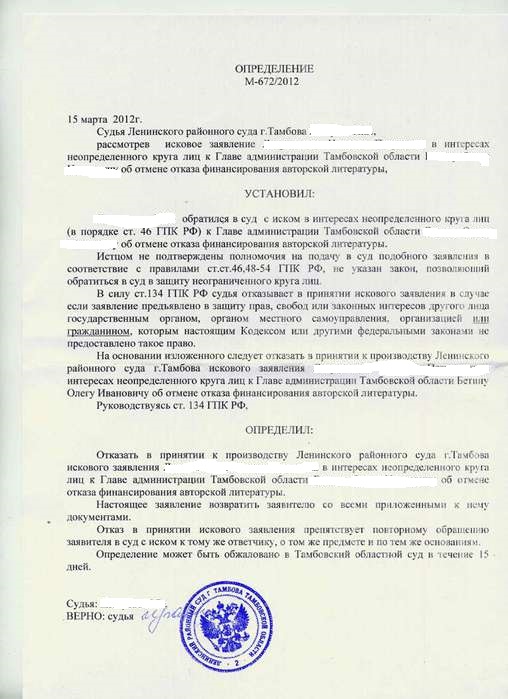The decision to refuse to accept the statement of claim is made by the court in accordance with the norms of the law. The list written in them is limited and at the same time related to other Codex standards. Without them, the provisions of Art. 134 GIC does not understand.
Denial of action
The judge accepts the claim, assessing compliance with formal criteria, and does not examine it on the merits. The decision on the refusal to accept the statement of claim shall be issued if there are immediately grounds that the proceedings on the case cannot be open. No substantive review is carried out, the judge decides on the basis of the available documents.

The refusal of the court is allowed in cases expressly prescribed in the procedural legislation; there is no broad interpretation of the list.
What the law says
The decision to refuse to accept the statement of claim is adopted in the following cases:
- the claim is not considered according to the rules of the Civil Procedure Code;
- a person who does not have the right to this claim has applied to the court;
- previously, a lawsuit with the same reason and the same grounds was already considered between the same parties, and a decision was made on it;
- a similar claim had already been examined on the same occasion and on the same ground, and the plaintiff refused the application;
- a similar lawsuit with the same reason and the same ground had already been considered, and a settlement was concluded;
- the case was examined by the arbitration court, and the state court upheld its decision by issuing a writ of execution.
Jurisdiction violated
Procedural legislation includes the concept of jurisdiction. It identifies cases that are considered by civil or general courts, which are arbitration, which are administrative or, rather, according to CAS. Indeed, both the civil procedure Code and the CAS are designed for courts of general jurisdiction.

Civil disputes include property and non-property disputes, the participants of which are either citizens or organizations, including commercial ones, or authorities. A prerequisite for transferring a case to civil jurisdiction is the mandatory participation of an individual who does not have the status of an entrepreneur.
If the participants are commercial organizations and individual entrepreneurs, the dispute is considered by the arbitration court.
In the ruling on the refusal to accept the statement of claim, the judge indicates which court, in his opinion, should apply.
The plaintiff is not entitled to claim
Appeal to the court is based on a power of attorney or legal representation (parents of guardians of minors and the legally incompetent).
The authorities also have the right (for example, the prosecutor's office or labor inspectorate) to protect the rights of citizens in cases specified by law, in particular, to file lawsuits.

A reference is made to contesting an act of an authority that should affect the rights and freedoms of the plaintiff (for example, unlawful allotment of land for which the plaintiff has a right).
The court ruling on the refusal to accept the statement of claim is connected with manifestly irreparable violations. In this situation, the number of failures is generally minimal, because judges are insured and leave the lawsuit motionless.
Case pending
The same reason and reason means the same circumstances, and the same violation. For example, a refusal to pay a debt on receipt. If the receipt is different, but the faces are the same, then the reason is the same, but the grounds are different. A dispute between the same persons regarding other rights or claims is not considered a similar claim.

If succession has occurred (through inheritance or reorganization), then the rule continues to apply, as the party has not changed. Article 134 of the Code of Civil Procedure of the Russian Federation, unfortunately, does not clarify the clause on changing a person acting as a party, giving rise to misunderstanding at times.
From the point of view of the waiver of the claim, the settlement agreement and the decision made exclude further proceedings.
Arbitration court
Samples of claims in arbitration courts are popular. Consideration of cases in them lasts a few days. A week or a little more.
An application for the issuance of a writ of execution is submitted in order to verify the result of the work of the arbitral tribunal on some points. If in doubt, the application is denied. As a result, the right appears to appeal to a general or arbitration court in a general manner.
What is a definition?
The structure is standard, according to the Code of Civil Procedure. Each judge has a sample determination to refuse to accept a statement of claim. The difference between them reflects the individual approaches of the judges and their assistants:
- date and place of removal (city or town);
- name of the court whose judge made the decision;
- information about the judge and sometimes the secretary;
- the essence of the dispute and the name of the parties to the dispute or the name, if it is an organization;
- the reasons why the judge decided to refuse to accept the claim and the reference to paragraph of article 134;
- the essence of the decision (to refuse to accept the statement of claim of such and such a person against such and such a person upon such and such a demand);
- description of the appeal procedure;
- judge's signature and court seal.
The document is sent to the plaintiff with copies of documents, a receipt on payment of state duty.

The lawyers' complaints are caused by the reluctance of judges to write motivated rulings, which, in addition to referring to the law and rewriting its provisions, explain why the lawsuit falls under the relevant clause of Art. 134 GIC. Do not confuse volume and motivation. Many judges write lengthy and at the same time short definitions without violating the requirements of the law.
Right of appeal
Judges or assistants sometimes go to the trick: they describe in a distorted form the appeal procedure and the time allotted for it. The flaw is laid directly in the sample definition of the refusal to accept the statement of claim. As a result, citizens lose the opportunity to file a complaint. Therefore, you should not believe in blind officials, and check all their actions and documents for compliance with the law.
Higher authorities carefully look at violations of the formal order and procedural rules. And a similar trick with a substantiated complaint can be counted as a minus judge.

Is it difficult to restore the deadline for appeal that was missed due to an incorrect clarification of the law by a judge? Yes, and the argument may be considered not significant enough.
The complaint is sent no later than 15 days from the date the court makes the determination. The countdown begins on the next day when the judicial act was passed.
The complaint is transferred to the court of first instance, which made the decision, all the participants in the lawsuit declared in the lawsuit are notified about it and they are given time to write and send a response to the complaint to the court.
After the expiration of the time allotted by the court, the materials with the complaint are transferred to the court of appeal.
For magistrates - district courts, for district - regional and equivalent courts of the subjects.
The main argument in such complaints is the lack of real grounds, as evidenced by the absence or vagueness of motivation, and an incorrect description of the appeal procedure.
Writing as an aid will help examples of complaints, not samples of claims.
